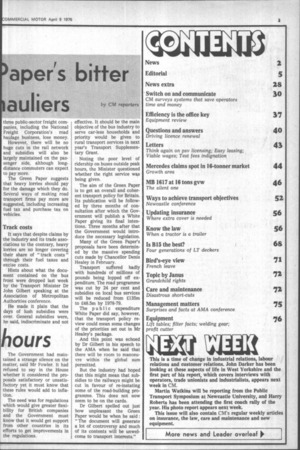hours
Page 5

If you've noticed an error in this article please click here to report it so we can fix it.
The Government had maintained a strange silence on the matter, said Mr Fowler. It had refused to say in the House whether it considered the proposals satisfactory or unsatisfactory yet it must know that these rules would add to inflation.
The need was for regulations which would give greater flexibility for British companies and the Government must know that it would get support from other countries in its efforts to get improvements in the regulations. effective. It should be the main objective of the bus industry to serve car-less households and priority would be given to rural transport services in next year's Transport Supplementary Grant.
Noting the poor level of ridership on buses outside peak hours, the Minister questioned whether the right service was being given.
The aim of the Green Paper is to get an overall and coherent transport policy for Britain. Its publication will be followed by three months of consultation after which the Government will publish a White Paper giving its final intentions. Three months after that the Government would introduce the necessary legislation.
Many of the Green Paper's proposals have been determined by the massive spending cuts made by Chancellor Denis Healey in February.
Transport suffered badly with hundreds of millions of pounds being lopped off expenditure. The road programme was cut by 24 per cent and subsidies on local bus services will be reduced from £135m to £48.5m by 1978-79.
The public expenditure White Paper did say, however, that the transport policy review could mean some changes of the priorities set out in Mr Healey's package.
And this point was echoed by Dr Gilbert in his speech to the AMA when he said that there will be room to manoeuvre within the global sum permitted.
But the industry had hoped that this might mean that subsidies to the railways might be cut in favour of re-instating some of the road-building programme. This does not now seem to be on the cards.
Dr Gilbert spelled out just how unpleasant the Green Paper would be when he said : "The document will generate a lot of controversy and much of its contents will be unwelcome to transport interests."




























































































































